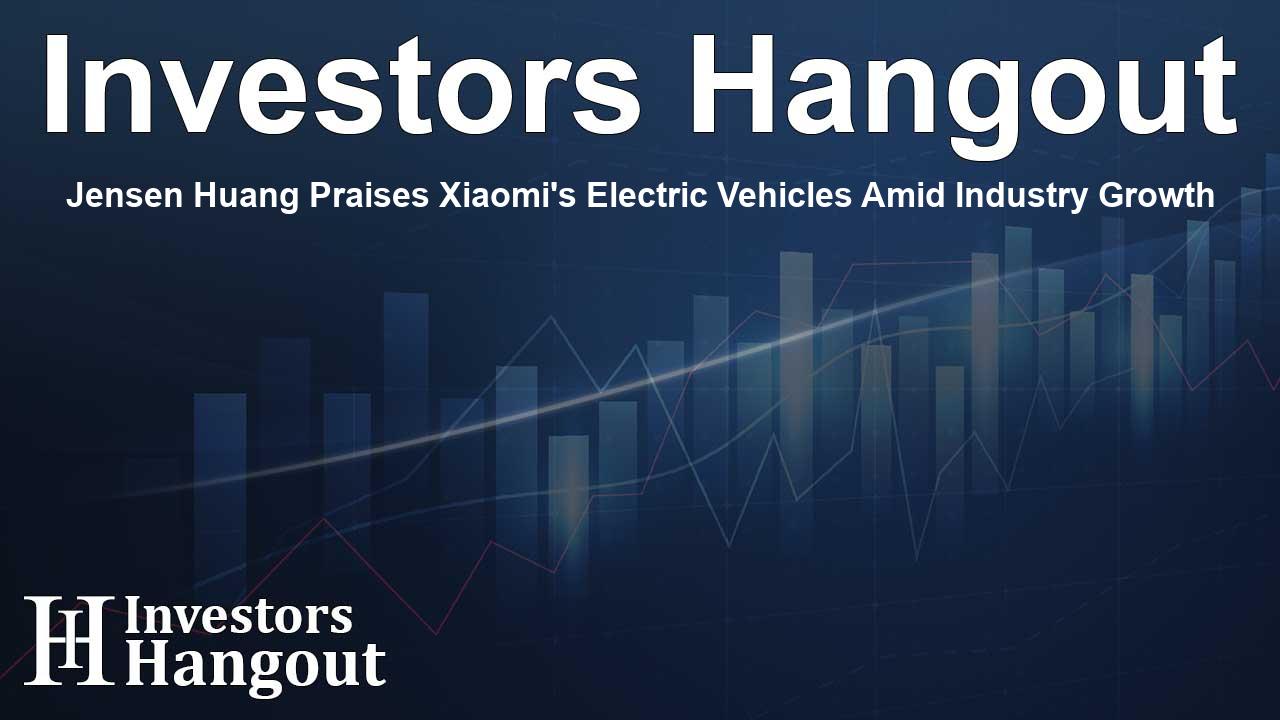Jensen Huang Praises Xiaomi's Electric Vehicles Amid Industry Growth

Jensen Huang's Admiration for Xiaomi's Electric Vehicles
Jensen Huang, the visionary CEO of Nvidia Corp. (NASDAQ: NVDA), recently expressed his admiration for the electric vehicle (EV) market in China, particularly highlighting the innovative advancements made by Xiaomi Corp. (OTC: XIACF). His comments came during a significant event focused on the future of supply chain logistics in China. Huang's enthusiasm for Xiaomi's electric vehicle offerings reveals both his insights into the industry and the remarkable progress being made in the automotive sector.
The Rise of Xiaomi in the EV Market
Despite being a newcomer in the competitive landscape of electric vehicles, Xiaomi has made remarkable strides. Huang noted that he would be thrilled to own a Xiaomi EV, a testament to the company’s rapid growth and commitment to quality. He emphasized how this embodies the broader transformation of the EV market in China, which has been evolving dramatically in recent years.
Impressive Growth and Demand
Huang highlighted Xiaomi's achievements, particularly their recent SU7 sedan line, which has managed to maintain monthly delivery figures exceeding 20,000 units consistently over nine months. Adding to their momentum, the launch of the YU7 SUV resulted in an impressive 200,000 pre-orders within the first three minutes of availability, showcasing a remarkable level of consumer interest and desire for innovative electric vehicles.
Xiaomi's Technological Edge
Xiaomi continues to push the envelope with its technological advancements in the EV sector. Their vehicles, such as the SU7 and YU7, are equipped with Nvidia's advanced chips. The SU7 utilizes the Orin chip, while the newer YU7 is powered by the innovative Thor chip, which features enhanced capabilities. This partnership enables Xiaomi to leverage cutting-edge technology to enhance user experience while driving.
Challenges and Competitors
While Nvidia remains a top supplier for China’s EV chip demands, other companies like Nio Inc. (NYSE: NIO) and XPeng Inc. (NYSE: XPEV) are also evolving rapidly. Both have started incorporating self-designed chips into newer models, showing that competition remains fierce in this dynamic market. Moreover, Xiaomi is developing its own in-house chip, Xring O1, which is currently utilized in its mobile devices, but deployment in its electric vehicles is still forthcoming.
The Broader Picture: AI and Geopolitics
Huang has acknowledged that artificial intelligence (AI) significantly influences China’s digital infrastructure, powering various applications, including those related to smart driving technologies in Xiaomi vehicles. This integration represents a fundamental shift in how technology is applied in the automotive industry, enhancing safety, efficiency, and user convenience.
Responding to Geopolitical Dynamics
In addition to praising Xiaomi, Huang also discussed Nvidia's overarching strategy amid geopolitical tensions. In a recent interview, he clarified that Nvidia's chips are not utilized for military applications in China due to strict export regulations. This highlights a clear distinction between commercial and defense technology markets, which may shape future partnerships and business strategies.
Nvidia's Future in the EV Ecosystem
As Huang continues to champion advancements in the EV sector, Nvidia's return to the Chinese market with its H20 AI chip reaffirms its commitment to remaining a significant player in this expanding field. This move may align with broader trade discussions involving rare earth exports, further solidifying Nvidia’s role in the development of technology essential to the EV industry.
Looking Forward
Huang's enthusiasm for Xiaomi's electric vehicles is indicative of a thriving market that is consistently pushing the boundaries of innovation. As companies like Xiaomi continue to flourish, the competitive landscape among automakers and chip manufacturers promises to evolve, offering exciting opportunities for consumers and investors alike.
Frequently Asked Questions
What did Jensen Huang say about Xiaomi's electric vehicles?
Huang expressed excitement about Xiaomi's innovations in the electric vehicle sector, stating he would be thrilled to own one.
How has Xiaomi performed in the electric vehicle market?
Xiaomi's delivery volumes for its SU7 sedan line have exceeded 20,000 units monthly over nine months, showing great demand.
What technology do Xiaomi's vehicles utilize?
The SU7 utilizes Nvidia's Orin chip, while the newer YU7 model is equipped with the Thor chip, enhancing performance and features.
Who are Xiaomi's main competitors in the electric vehicle space?
Main competitors include Nio Inc. and XPeng Inc., both of which are integrating self-designed chips into their vehicles.
What is the significance of Nvidia's role in the EV market?
Nvidia is crucial for supplying chips for electric vehicles, boasting strong partnerships that enable advancements in smart technology.
About The Author
Contact Dylan Bailey privately here. Or send an email with ATTN: Dylan Bailey as the subject to contact@investorshangout.com.
About Investors Hangout
Investors Hangout is a leading online stock forum for financial discussion and learning, offering a wide range of free tools and resources. It draws in traders of all levels, who exchange market knowledge, investigate trading tactics, and keep an eye on industry developments in real time. Featuring financial articles, stock message boards, quotes, charts, company profiles, and live news updates. Through cooperative learning and a wealth of informational resources, it helps users from novices creating their first portfolios to experts honing their techniques. Join Investors Hangout today: https://investorshangout.com/
The content of this article is based on factual, publicly available information and does not represent legal, financial, or investment advice. Investors Hangout does not offer financial advice, and the author is not a licensed financial advisor. Consult a qualified advisor before making any financial or investment decisions based on this article. This article should not be considered advice to purchase, sell, or hold any securities or other investments. If any of the material provided here is inaccurate, please contact us for corrections.
